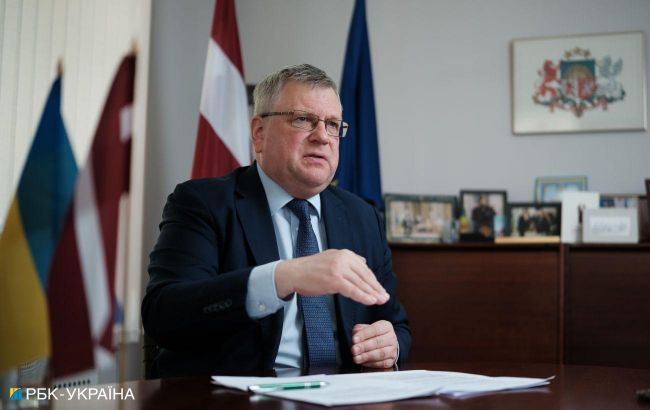Latvian Ambassador reveals how ethnic Russians spy against NATO
 Photo: Ambassador of Latvia to Ukraine Ilgvars Kļava (Vitalii Nosach, RBC-Ukraine)
Photo: Ambassador of Latvia to Ukraine Ilgvars Kļava (Vitalii Nosach, RBC-Ukraine)
Russia is trying to use ethnic Russians and their relatives in Western countries based on emotional attachment, in particular, for espionage purposes. The Russians seek to use all channels to achieve their goal, according to the Latvian Ambassador to Ukraine Ilgvars Klava.
“One goal is of course, NATO forces' presence in Latvia, in all Baltic states, and also in Poland, Romania, and all the Eastern flank of NATO. Of course, there is Russian interest there: spying, what is happening, what kind of NATO forces are coming in, gathering information,” Klava said.
Furthermore, according to the Latvian Ambassador, Russia also uses the local population for espionage and further information gathering.
“They are being caught, they have been tried and sentenced,” he said.
Small annoying things
Additionally, as noted by Klava, Russians attempt to do small annoying things.
"In Latvia, like scratching the 'Z' sign on a wall or something like that. It doesn't mean much, but it's just to create a kind of psychological discomfort, if at all," he said.
The Latvian Ambassador also points out that there have been cases in their country where some historical monuments were damaged with paint.
“It is not, so to say, life-threatening, but it's annoying. But people are being caught, and people also are sentenced,” noted Klava.
According to him, for example, police recently caught a man who threw a Molotov cocktail through the window of the Museum of the Occupation of Latvia. He was recruited through Telegram channels by a person who was in prison.
Russian spies in Western countries
Recently in Romania, a spy was arrested for transmitting data to Moscow about military equipment for Ukraine.
It was also reported that a former officer of the Federal Office for the Protection of the Constitution and the Fight against Terrorism was arrested in Vienna on suspicion of spying for Russia.
Additionally, in early May, Polish Prime Minister Donald Tusk proposed to re-establish the Polish Commission to Investigate Russian Influence. The reason was the incident involving Polish judge Tomasz Szmydt and the risk of increased espionage in the country in favor of Russia.

